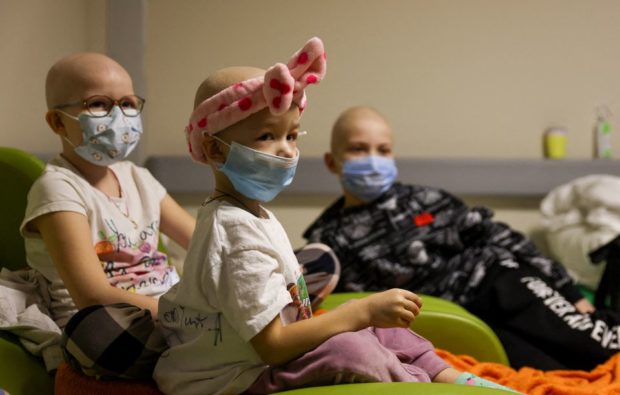Medics and volunteers try to prop up Ukraine’s health system

Children patients whose treatments are underway sit on chairs moved to the hallways of basement floors of Okhmadet Children’s Hospital in Kyiv, Ukraine February 28, 2022. REUTERS
LONDON — When Russian bombs started falling on Kyiv, oncologist Nataliia Verovkina fled with her 10-year-old son. But once he was safe in Munich with his grandparents, she turned around and went back.
“Someone had to help these people,” Verovkina, 43, who works at Ukraine’s National Cancer Institute, said by phone from the capital. “It was harder for me to do nothing.”
Verovkina joins a growing army of medical professionals and volunteers, from Ukraine and abroad, who have been working under desperate circumstances to keep the country’s healthcare system going since the conflict started on Feb. 24.
The situation is particularly dire in besieged cities such as Mariupol and Kharkiv, where days of intense fighting and a lack of food and medicines threaten millions of civilians, humanitarian agencies said.
The World Health Organization (WHO) said on Monday its teams were working round the clock to get supplies into Ukraine. Since March 5, it has delivered 90 tonnes of medical aid, including emergency surgery kits, ventilators and essential medicines.
Article continues after this advertisementBut the WHO has been unable to reach a number of cities where more and more people have no access to medicines or care and it is lining up shipments for when they can be delivered, spokesperson Tarik Jarasevic said from the western city of Lviv.
Article continues after this advertisementIn Kyiv, the cancer institute where Verovkina works is still functional, though its surgical departments are only providing emergency medical care and staff are concerned about the coming days as fighting escalates in the suburbs of the capital.
Valentina Ocheretenko, chair of the Ukrainian Diabetes Foundation, said the situation was dangerous for Ukraine’s 2.3 million diabetes patients, 120,000 of whom have type 1 diabetes and require regular doses of insulin and monitoring to survive.
Every night, she works into the small hours with international partners to try to match up the dwindling supplies of insulin and glucose meters to monitor blood sugar levels with the overwhelming demand.
‘It’s too much’
“I fear for people with diabetes, it’s too much,” Ocheretenko said by phone from Kyiv, adding that she worries the county’s health system has already “fallen down”.
Her adult daughter, who has Type 1 diabetes, had to receive emergency care last week after a dangerous episode of hypoglycemia, or low blood sugar levels, after struggling to find regular meals.
She is doing better now but the pressures on hospitals are acute and some diabetes patients are not always getting the care they need, said Ocheretenko.
The WHO has warned that infectious diseases, including COVID-19, are another risk, especially with millions of people fleeing the fighting on the move in Ukraine and abroad.
Ukraine’s Alliance for Public Health is helping patients with HIV/Aids, tuberculosis and hepatitis. Its ambulances are now delivering medicines and food, as well as evacuating people from heavily shelled areas such as the town of Irpin.
The charity has also set up a helpline to ensure people can get the drugs they need. The Alliance’s Inna Gavrylova came up with the idea after fleeing with her family to the relative safety of the Ivano-Frankivsk region in western Ukraine.
“I could not sleep at night,” she said, as she realised those in need of constant treatment were especially vulnerable.
Oncologist Verovkina, too, said helping others was the only way to process the trauma of war.
“Many doctors are volunteering to work overtime. Working helps (us) to cope with the current situation more easily.”
RELATED STORIES
China denies US claim that Russia asked for help in Ukraine
War could be over by May, says Ukrainian presidential adviser
Battleground Ukraine: Day 19 of Russia’s invasion